Natural Home Remedies for Ear Pain
By Dr Anuja Bodhare +2 more

Get,

to manage your symptom
Get your,


4 Cr+ families
benefitted

OTP sent to 9988776655



You’ve successfully subscribed to receive
doctor-approved tips on
Whatsapp

Get ready to feel your best.

Hi There,
Download the PharmEasy App now!!


Register to Avail the Offer
Send OTPBy continuing, you agree with our Privacy Policy and Terms and Conditions

Hi There,
Sign up on PharmEasy now!!
Trusted by 4 crore+ families

OTP sent to 9988776655



You have unlocked 25% off on medicines




Code: NU25
By Dr Anuja Bodhare +2 more
Table of Contents
Anybody who has ever got ear pain knows how annoying it is. The pain is oddly challenging to endure. You can experience this pain in either one or both ears. It might be a dull or sharp pain. You might feel this pain for a short period, or it can continue for longer. Most of the time, this pain goes away on its own. In children, ear infections are the most common cause of ear pain, while it is less common in adults. In adults, ear pain may be referred from another body site. i.e. the actual pain is somewhere else (tooth, throat, etc.), and pain occurs in the ear1. Continue reading to know more about the home remedies for ear pain.

When the tube in the ear, called the Eustachian tube, gets filled with fluid and is blocked, it leads to pressure build-up behind the eardrum or ear infection. This might cause ear pain2.
Earache in adults is rarely due to an ear infection. Commonly, earache is due to pain from some other part like teeth, jaw, or throat that is felt in the ears. The conditions which cause ear pain are3:
In children or infants, the following can cause ear pain3:
Ear pain is a symptom that can occur due to any of the reasons stated above. However, here are a few associated symptoms mentioned that might help you recognize ear pain:
You can notice the following symptoms of ear pain in babies and children:
If you have a swimmer’s ear, you might experience:
If you have malignant otitis externa, in addition to the above symptoms, you might also experience4:
Ear pain can be very uncomfortable and can cause a lot of distress. You might find yourself seeking a remedy to relieve this pain, as it can be challenging to endure. Here are a few home remedies for ear pain that have been tried and tested by many; you can try them out to bring relief.
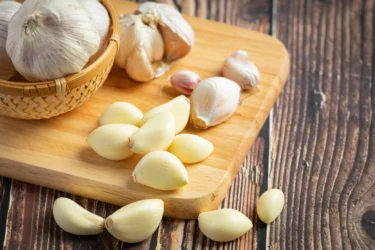
Garlic is a herb commonly used as a remedy for managing various conditions due to its inflammation-alleviating properties. It is also effective against different bacteria. A study5 shows garlic and its derivatives effectively eliminate ear infection-causing bacteria (P.aeruginosa and K.pneumoniae). To use it as a remedy for ear pain, you can eat one clove of crushed garlic daily or mix garlic in coconut oil and apply it around the ear. Please do not put the garlic inside your ears as it may harm your ears.

Ginger as a home remedy is quite prevalent and is used for many conditions. Various extracts of ginger are potent and can help in alleviating inflammation and reducing pain6. A little bit of ginger juice can be applied around the ear to relieve pain. It should not be applied inside the ear or be used as ear drops.
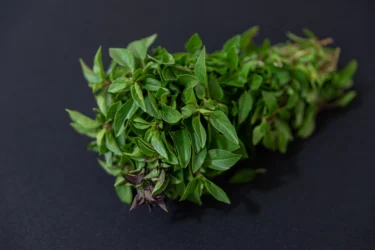
Tulsi is known as the ‘Elixir of life’ in Ayurveda as it is used for managing many conditions. It is also called Holy basil, an aromatic herb of medicinal importance. It has inflammation-reducing action along with other therapeutic actions. Therefore, for relieving earache, tulsi can be used as ear drops7. For making ear drops from tulsi, you simply have to take a few tulsi leaves and crush them to obtain the juice; this juice can be used as ear drops. Kindly ensure that you consult your doctor before putting it in your ear.
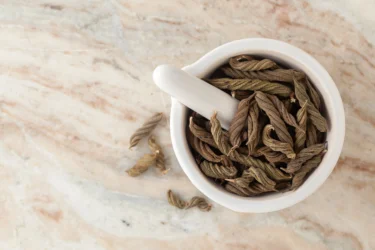
Avartani is known as the Indian screw tree in English and Marod phali in Hindi. This plant has healing properties and is used to manage various other ailments besides earache. The use of avartani for earache is mentioned in Ayurveda. As a remedy for earache, crushed pods are used. You should add an avatar to gingerly oil and boil it. The oil can be used as an ear drop for relieving pain8. Ensure you consult your Ayurvedic physician before putting anything inside your ear.
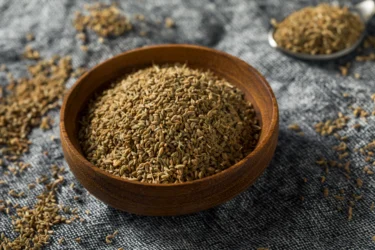
Ajwain helps in dealing with ear pain. For the remedy, you need to take a few ajwain seeds, add a few cloves of garlic, and boil it in a little bit of sesame oil. The oil should be boiled until the ingredients become red. The oil should then be filtered and applied as drops in the ear8. Kindly consult a physician before putting anything inside your ear.
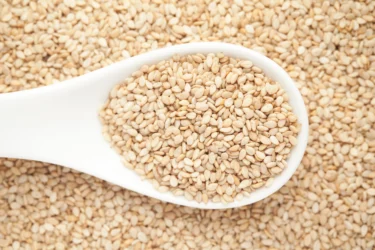
Til is also known as sesame or gingelly oil seeds in English. Ayurvedic use of this seed ranges wide for the management of various conditions. Til is used as a home remedy for the management of earache. It softens the ear wax, thus helping to keep the ear clean. A little bit of til oil should be warmed along with a few crushed garlic cloves. A few drops of lukewarm oil can be applied to the ear externally to relieve earache8. You should consult your doctor before putting anything inside your ear.

You can use a hot or cold pack for compression over your ear to relieve ear pain1. There is no exact temperature to be maintained, so you can use a cold or hot temperature that you are comfortable with. Just ensure that you wrap the hot or cold object you’re using for compression in a towel so that it’s not too hot or too cold. Every 10 minutes, you can try alternating the hot and warm compress. Please be cautious while taking a hot compress, as it can burn your skin if the compress is too hot.

Decreasing the pressure on the ear can reduce your ear pain. You can try resting your head on pillows (two or more) and keeping your head in a higher position than your body1. You should also avoid sleeping on the side of the affected ear. For example, if your right ear has an infection, you should try sleeping on your left side. Altering your sleeping position can help relieve your ear pain by reducing the pressure in the ear.
Also Read: Natural Home Remedies For Vomiting
It is advised that you seek medical help if:
Also Read: Natural Home Remedies for Leg Pain
Sharp or dull pain in one or both ears can be due to fluid build-up in the ear tubes. This increased pressure might be the cause of earache. It can occur in children as well as in adults. The pain can be due to various reasons like swimmer’s ear, otitis media, pain in the tooth, arthritis of the jaw, or temporomandibular joint syndrome. The pain usually goes away on its own. However, you can try a few home remedies like garlic, ginger, tulsi, and hot or cold compress to relieve the pain. If you feel like the pain doesn’t subside, gets worse, or if your severe pain suddenly disappears, you should visit a doctor and get yourself checked.
Also Read: Effective Home Remedies for Lice Removal
Yes, ear pain can occur either in one or both ears. The pain can be sharp or dull for a short or long time.
No, ear infection rarely causes hearing loss. In most cases, children might experience temporary hearing loss after an ear infection, which goes away. However, in repeated ear infections, the hearing loss can be long-lasting.
No, there is no evidence of toothpaste healing ear infections or ear pain. You should always consult your doctor before putting anything in your ear.
No, swimmer’s ear doesn’t occur only in swimmers; it can also occur in others. Swimmer’s ear is the common name of the condition called otitis externa. It occurs commonly in teenagers and young adults and can occur due to an infection of the respiratory system, like a cold or middle ear infection. Swimming in water containing bacteria can cause this condition.
Ear pain can have various causes, including ear infections, sinus infections, dental issues, allergies, foreign objects in the ear, earwax buildup, and temporomandibular joint (TMJ) disorders. It can also result from throat infections or referred pain from nearby structures.
Ear drops can be safe and effective for relieving certain types of ear pain, especially if recommended by a healthcare professional. However, it’s crucial to follow the instructions carefully and avoid using ear drops if there is a possibility of a ruptured eardrum or if the ear pain is severe.
Home remedies for ear pain relief include applying a warm compress, using over-the-counter pain relievers (following label instructions), keeping the head elevated while resting, and avoiding inserting objects into the ear canal. However, if the pain persists or worsens, it is essential to seek medical attention.
Yes, some people may experience ear pain or discomfort during airplane travel, particularly during takeoff and landing. This is due to changes in air pressure that affect the middle ear. Chewing gum, swallowing, or yawning can help equalize pressure and alleviate ear discomfort.
Yes, sinusitis, an inflammation of the sinuses, can cause ear pain. The sinuses and the ears are connected by the Eustachian tubes. When the sinuses are congested or inflamed, it can affect the Eustachian tubes, leading to ear pressure and pain.
Disclaimer: The information provided here is for educational/awareness purposes only and is not intended to be a substitute for medical treatment by a healthcare professional and should not be relied upon to diagnose or treat any medical condition. The reader should consult a registered medical practitioner to determine the appropriateness of the information before consuming any medication. PharmEasy does not provide any guarantee or warranty (express or implied) regarding the accuracy, adequacy, completeness, legality, reliability or usefulness of the information; and disclaims any liability arising thereof.
Comments

Leave your comment...
You may also like
Comments